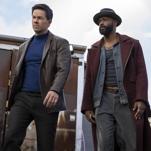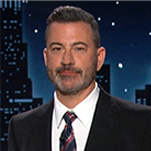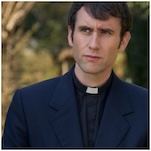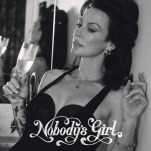The 25 Highest-Grossing Superhero Movies of All Time
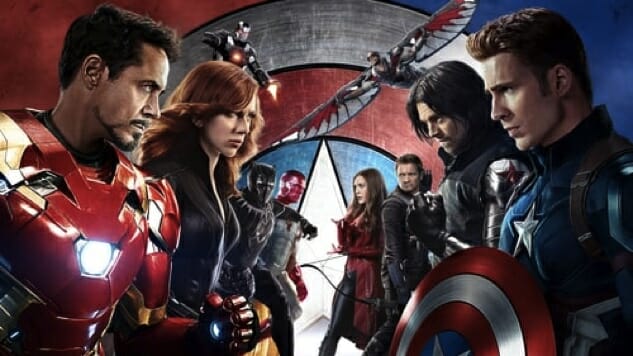
There’s a reason that movie studios continue to spend hundreds of millions of dollars on superhero movies. More than a quarter of the 100 highest-grossing movies of all time revolve around super-powered humans saving the world from nefarious plots by evil villains. Fourteen superhero films have grossed more than $1 billion worldwide, including nine films from the Marvel Cinematic Universe. And with three superhero movies hitting joining the billionaires club this year, the superhero trend is showing no signs of slowing down. Marvel already has 15 more films scheduled through 2023, and DC has no fewer than 25 films in various stages of development.
While almost all of the movies below are based on Marvel or DC Comics characters, we have to tip our hat to Pixar, who managed to make the list with an original cast of heroes—or at least the sequel to an original cast of heroes. But the vast majority of the superheroes represented here are 20th century gifts that keep on giving back billions of dollars each year.
Here are the 25 highest-grossing superhero movies of all-time:
25. Deadpool 2 (2018)
Box office: $787 million
Director: David Leitch

Deadpool 2 never stops leaping around and jumping for your attention, in a way that’s more winning and affable than it probably should be. A lot of this is Ryan Reynolds, but the expanded cast brings plenty to the table as well. Zazie Beetz of Atlanta is certainly the standout of the X-Force crew, as a mutant whose talent is “being lucky,” which doesn’t sound like a superpower but certainly feels like one when you see it in action. (It might actually be the best superpower.) Rob Delaney has a delightful small role as the least gifted but most relatable member of X-Force. And Brolin gives the film an added gravitas that it doesn’t necessarily need but certainly doesn’t hurt. But this is Reynolds’ show: He is grandmaster and main event of this circus, all by himself. Ultimately, Deadpool 2 is a film that works best when it’s entirely irreverent about its own irreverence, when it is constantly riffing on its increasingly large place in the comic book movie canon. (It even notes that it’s the reason Logan existed.) It’s tough to create a universe like that, and it’s that, not the love story or Deadpool’s journey, that sets these films apart. I don’t remember the last time I enjoyed a post-credits sequence. But I didn’t want Deadpool’s to end. It’s all disposable, but in this franchise’s case, that’s a happy feature, not a bug. —Will Leitch
24. Spider-Man 2 (2004)
Box office: $795 million
Director: Sam Raimi

Sam Raimi’s second turn at the franchise helm yielded what at the time was arguably the best superhero film ever, and one that, as its ranking on this list shows, holds up well a decade later. Spider-Man 2 relies on the same formula which made the first so well-received—non-intrusive fan service/call backs to the classic comics coupled with a faithful-enough rendition of a classic Spider-Man villain. Though his origin drifts a bit from the comics, Alfred Molina’s Doctor Octopus is a delight, giving the film an emotional resonance on both sides of the classic hero/villain dichotomy even as it provides the wall crawler with an intelligent, deadly foe. The film also features one of the best fight scenes in the history of comic book films, made even better by the emotional punch of its conclusion, as an unconscious Spidey is supported and protected by the New Yorkers he has saved. Sadly, this effort would prove the apex of the Raimi/Maguire/Sony collaboration—and the best of the Spider-Man films thus far—though with the webslinger’s inclusion in the MCU, there’s hope. —Michael Burgin
23. Deadpool (2016)
Box office: $801 million
Director: Tim Miller

After Deadpool grossed nearly $800 million worldwide, you’d have to feel pretty stupid if you were one of the studio bigwigs who Ryan Reynolds fought tooth and nail to get the film made. Huge credit must go to Reynolds himself, who displayed superhuman resolve in continuously pushing for this film and for the chance to play the wisecracking Deadpool, who he sensed for years was a kindred spirit, but it still took a piece of leaked test footage going viral for Fox to greenlight it. Even after the abortive mess of the character’s pseudo-appearance in X-Men Origins: Wolverine, Reynolds and co. knew that the character of Deadpool was exactly what the now-rote superhero film genre desperately needed—someone who could step back from the conventions of the genre to critique (and lewdly skewer) it all. Deadpool overdelivers on crass, raunchy humor, providing exactly what paying audiences wanted to see. Perhaps its most significant accomplishment, though, was proving that a B-tier superhero (in terms of audience recognition) could be hugely marketable, given the right script and casting. The success of Deadpool is a seed that will hopefully bear fruit as studios take a gamble on new comics properties detached from the MCU or DCU. —Jim Vorel
22. Wonder Woman (2017)
Box office: $821 million
Director: Patty Jenkins

Considering that the character of Wonder Woman was the only one in Batman v. Superman that didn’t want to yank your eyeballs out of your head with a spork, it perhaps shouldn’t be a surprise that Wonder Woman is light-years better than anything else the newfangled DC cinematic universe has produced. It’s not quieter necessarily, but it is more measured, more comfortable in its own skin, less fanboy desperate to keep waving keys in front of your face—exploding keys—to make sure it has the full attention of all your assaulted senses. It feels almost old-fashioned in its themes of the goodness of humanity—and the debate alien outsiders have about whether or not humans are worthy of redemption—and the selflessness of one for a greater good. It still has too many skyscraper-sized god-monsters blowing up whole acres in hackneyed super slo-mo, and it doesn’t have much you haven’t seen before, but that it simply tells one story in linear order with logical progression … man, when it comes to these movies, it almost feels like a miracle. By the end, Jenkins can’t help but give herself up to the DC world; she loses the touch so thoroughly in the last 10 minutes that it actually feels directed by Snyder. Jenkins is so effective at steadfastly making her own movie for most of the running time that it can’t help but be a bummer when she hands over their reins to the franchise down the stretch. But that she even made it as far as she did is a serious achievement. Wonder Woman won’t reinvent the superhero franchise, or the origin story. But it does show how compelling they can still be, when someone is allowed to do them right. —Will Leitch
21. Spider-Man (2002)
Box office: $826 million
Director: Sam Raimi

If this was a list of the most influential or important superhero films, then Sam Raimi’s 2002 film would come in well ahead of its 2004 sequel—perhaps even top three. Though there had been a few Marvel movies before it (X-Men, Blade), Spider-Man showed how exhilarating it could be when a film strove to do the Marvel universe justice rather than apologizing for and obscuring the source material. Granted, a few decades and casting iterations from now, Tobey Maguire will likely not be considered the best Spider-Man ever, but he was good enough. (And J.K. Simmons’ turn as J. Jonah Jameson will likely never be touched.) More importantly, in the hands of Raimi, a Spider-Man fan with chops, Spider-Man carried with it the same species of wonder that Jurassic Park had—instead of “Wow, this is what it would be like to see real dinosaurs,” we got to see what it was like for a comic book to come to life. —Michael Burgin
20. Venom (2018)
Box office: $854 million
Director: Ruben Fleischer

Deep into the goop of Venom, ersatz Elon Musk, Carlton Drake (Riz Ahmed), performs alien-human hybrid experiments on San Francisco vagrants (of which there are many, the movie implies, because San Francisco is the urban poster child for the housing crisis) to eventually figure out how humans can live off-planet. Dr. Skirth (Jenny Slate, token and expendable lady scientist) tells Vice-like multimedia alt-reporter Eddie Brock (Tom Hardy) that Drake has been urgently planning his interstellar escape because our species basically has a generation left, if that, before catastrophe. Brock understands completely, nods without flinching at Skirth’s prognostications. He’s also about to understand exactly what those experiments are like, soon to be intimately inhabited by an alien who goes by the name of Venom in an adventure resembling a comic book movie made before there was such a thing as an MCU, or a DCEU, or a Deadpool openly tearing away the veil that separates continuities and studio properties, exposing these enterprises as divided up only by billions of dollars, not by allegiance to canon or adherence to the tenets of comic book release strategies. Which is why Ruben Fleischer’s unabashedly pulpy Venom sometimes feels so special: It exists on its own. It concerns itself with modern problems in a modern world, but it acts like an early-2000s sci-fi blockbuster, molecularly unable to take itself seriously. It relies on a popular existing property within a genre enjoying unprecedented popularity, populated by Oscar-winning actors and unheard-of budgets, but it doesn’t pretend to have any claim to the well-established universes it can only point to, would seem to never dream of awards talk or critical love. It has Tom Hardy chewing so gleefully through its celluloid we should have talked awards and should have flirted with better critical love, but it also doesn’t quite do much of anything, doesn’t quite go far enough, with the insanity it potentially wields. It’s not a buddy comedy, but it’s also not not a buddy comedy. Venom could have been the most original superhero movie to come out in a long time, had it been released ten years ago. They just don’t—and one could argue for good reason—make movies like this anymore. —Dom Sinacola
19. Thor: Ragnarok (2017)
Box office: $854 million
Director: Taika Waititi

Like the GotG films, the closest non-Thor cousins in tone and spirit to Thor: Ragnarok, director Taika Waititi’s film opens with a lively prologue/set piece involving its protagonist Thor-ing like a boss accompanied by a rockin’ tune. In a nod to all the comic book fans jonesin’ to see Mjolnir put through its paces, Thor just all-out wrecks all who oppose him. From there, Waititi keeps the pace swift, resolving a few plot cliffhangers, throwing down an extended cameo from the Master of the Mystic Arts, introducing this film’s big bad in Hela (a dependably enjoyable Cate Blanchett), propelling Thor (and Loki) to their next stop on the “it’s a big universe” express, meeting new faces (Jeff Goldblum’s Grandmaster and Tessa Thompson’s Valkyrie foremost among them), and reuniting with everyone’s favorite green-thewed god-pummeler before bringing it all back for the big finale in Asgard. The result? One of those two-hour-plus films that you’ll swear was just an hour-forty. Granted, there are times when Waititi’s signature deadpan conversational levity doesn’t quite work—when the achieved effect is “distracting awkward” instead of “funny awkward”—but that’s an unavoidable by-product of prolonged comic riffs and, more importantly, the audience is not given much time to ponder before the next joke (or gorgeous action shot) is upon them. By now, it’s not saying anything new to appreciate how well Chris Hemsworth occupies the role of the God of Thunder. Or even, after his turn in the Ghostbusters reboot, to marvel at his comic chops. Nonetheless, Waititi seems to delight in exploring the interplay between Hemsworth’s physical and comic presence. It yields a version of Thor that might annoy some comic book purists (but certainly didn’t this one), but it’s an undeniable asset for the franchise. Some years and a few Avengers films remain before we’ll know what’s next for Thor (and whether it will involve Hemsworth), but after seeing Thor: Ragnarok, I’m suddenly eager to find out. —Michael Burgin
18. Batman v Superman: Dawn of Justice (2016)
Box office: $868 million
Director: Zack Snyder

If it achieves anything, Zack Snyder’s messy, badly plotted and awkwardly paced film proves that prepping for a shared universe is no simple task, no matter how easy Marvel makes it look. This seems true even when one is starting with one as established and as powerfully etched into the popular consciousness as DC’s. It’s bad enough that Snyder and company dutifully preserve and transfer many of the excesses and offenses from Man of Steel to Batman v. Superman: Dawn of Justice—the wildly out-of-character behavior by our heroes and a super-mobile Lois Lane to prod the plot along when needed, etc.—the film also is filled with plot holes large and small that will niggle at the mind of those viewers who like their fantasy films to make sense at least within the confines of the worlds they portray. Ultimately, Batman v Superman: Dawn of Justice serves as a reminder of why so many people dislike the Snyderian take on the DC universe—and as a reason to look forward to the solo Wonder Woman film. (See full review.) —Michael Burgin
17. Guardians of the Galaxy Vol. 2 (2017)
Box office: $869 million
Director: James Gunn

To a large extent, GotG Vol. 2 follows the playbook from the first film, though now, with the entire cast familiar faces to the audience, Gunn skips introductions and goes right to the funny. In this case, that means an opening credits sequence featuring the entire team and what amounts to a highlight reel of character traits meant to amuse: rapid banter from Star-Lord (Chris Pratt) and Rocket Raccoon (Bradley Cooper), humorous ’roid-rage from Drax (Dave Bautista), quiet bad-assitude from Gamora (Zoe Saldana) and an extended cute-Groot frolic. During this sequence and throughout the movie, the comic elements of this particular space opera feel as if they have been ratcheted up. But though he doesn’t seem to want the audience to have too much time between laughs, Gunn also seems determined to match the increased comic volume with more heart. Daddy issues, sibling rivalry, friendship struggles and questions of what makes a family, all themes present in the first film, are even more evident in the sequel. That’s not to say they are subtly or deeply explored—this is space opera, after all—but they give the proceedings a bit more oomph than if it were all quips and pratfalls. By the end of Guardians of the Galaxy Vol. 2, the audience is unlikely to feel they’ve seen anything that different from Vol. 1, but it’s clear that Gunn and company knew exactly what qualities made the first film so enjoyable, and what they needed to do to make sure this particular sequel was worth the wait. —Michael Burgin
16. Spider-Man: Homecoming (2017)
Box office: $880 million
Director: Jon Watts

It’s simultaneously easy and impossible to forget that Spider-Man: Homecoming is part of the Marvel Cinematic Universe. Easy, because unlike most every MCU film before it, with the partial exception of Doctor Strange, it manages to extricate its characters (and especially its scope) from the world-ending catastrophes faced by The Avengers to tell a story that is a little bit more “close to the ground,” to use Tony Stark’s (Robert Downey Jr.) own words. Impossible because, well, Tony Stark is in this. Quite a bit, actually. Nevertheless, Homecoming manages to pull off the most difficult feat for just about any franchise installment: It justifies its own existence. Briskly paced and charming to a fault, it’s a Spider-Man movie that fully embraces both its source material and the perils of 21st century teenage life. (See full review.) —Jim Vorel
15. Spider-Man 3 (2007)
Box office: $895 million
Director: Sam Raimi

A cautionary tale in how a successful franchise can maintain most of the ingredients in its creative team, and yet still be derailed by what seems like the smallest of adjustments. Sure, Spider-Man 3 was a financial success—$890 million or so in worldwide box office on a budget of $258 million—but it also sported some “classic” transgressions of the genre. There’s the overly convenient—and worse, unnecessary—sewing together of plot points that were originally disparate. (Flint Marko is also the man who shot Unca Ben!) There’s the cramming of too many subplots and villains into the movie (the latter tendency perhaps best thought of as a Schumacher Effect). And then there’s a few eyebrow-raising moments unique to the film, like, sigh, that Jazz club scene. All in all, it represents a sudden low for anyone relishing the high of its predecessor, and the end of the Raimi-Maguire era. —Michael Burgin
14. The Dark Knight (2008)
Box office: $1.002 billion
Director: Christopher Nolan

Christopher Nolan’s Batman Begins (2005) deserves the collective sigh of relief it received in resuscitating the Caped Crusader’s cinematic reputation following Joel Schumacher’s 1997 neon-disco nightmare on ice that was Batman & Robin. And if Batman Begins represents the character’s tonal course correction, The Dark Knight provided an equally important act of rehabilitation—that of Batman’s arch-nemesis, the Joker. (Let’s face it, though not a crime of Schumacherian dimensions, Jack Nicholson’s Joker fell short of setting a standard for the character.) Though ostensibly part of the superhero stable, The Dark Knight is, at its center, a proper crime saga—just as was its source, spawning from the pages of Detective Comics. Nolan’s take on Gotham’s cowled vigilante is less Spider-Man than it is Heat, in rather dramatic costume. Significantly trading up in the villain department this round, Heath Ledger’s performance as the Clown Prince of Crime is a force of nature—brilliantly written as a crime boss who wants no less than Gotham’s very soul. Ledger’s Joker is as chilling as he is darkly funny, and the most bracing reminder to date of why he’s the most renowned foe of the World’s Greatest Detective. It’s also the reason the film ranks as high as it does on our list. —Scott Wold
13. Joker (2019)
Box office: $1.020 billion
Director: Todd Phillips

More than any of Todd Phillip’s previous films, Joker is a culmination of whatever worldview the director’s got, a hollow gesture toward humanity rendered in the ugliest genre contrivances he could get the studio to permit, reveling in the illusion of artistic risk. In exploring the last vestiges of civil life to which a mentally ill man clings—watching with impressive intimacy as Arthur unravels amidst losing his clown-for-hire job, his mother (Frances Conroy without much to do) and his grip on reality—Phillips finds no throughline but hate, his disdain emerging from, sewn through, the relentless gray grime of Gotham City like a rising army of folks in clown masks. Viscerally, the film can be a wonder. Joaquin Phoenix is undoubtedly something to behold, his body as Arthur Fleck like a refutation to the sad, blocky menace his flesh harnessed in You Were Never Really Here. Incomprehensible angles, buzzing energy and the ever-increasing sense of a Southern dandy swagger, Phoenix’s corpus inhabits every frame like he’s clinging to it to stay upright lest he shrink into himself and disappear completely. We completely forget that we’re watching a DC property. Which is probably Phillips’ intent: His take on the comic book origin story is to take it so seriously it isn’t one, to sap the genre of all the wit and originality it has at its best so that any allusions to Bruce Wayne, literal or otherwise—to his family, his birth as Batman, his best friend/ersatz dad Alfred or Arthur’s ultimate connection to his future arch-nemesis—feel studio mandated rather than integral world-building or meaningful ballast for the film’s simple plot. Meanwhile, any commentary Joker attempts regarding class struggle is used only to plunge the film’s world into further darkness. The rich are pompous monsters who wear tuxedos to see Modern Times; the working class are husky bros ready to let a protest escalate quickly into mass murder. Do not let anyone tell you that Joker captures our specific time, represents our specific society, both births and defines our specific zeitgeist, grabs ahold of our specific faces and breathes smoke down our throats. It doesn’t. Joker is, more than anything, fine. And we, more than anything, are not. —Dom Sinacola
12. The Dark Knight Rises (2012)
Box office: $1.084 billion
Director: Christopher Nolan

At two hours and 44 minutes, The Dark Knight Rises is way too long … and way too short. Welcome to the temporal paradox that is the third, final and a bit overladen entry of Christopher Nolan’s tripartite take on the caped crusader. In the third film of his trilogy, Nolan brings his A game (and A team, for that matter) to bear in an attempt to at least match the billion-dollar-grossing, Heath Ledger-elevated The Dark Knight in tone, tenor and pace. But between multiple characters afflicted with “plotty mouth” and a need to have readers suspend disbelief early and (a bit too) often, this trilogy capper falls well short of the two films that preceded it. After all, nearly three hours may seem like a long time to maintain tension and viewer interest in anything not involving hobbits or the NFL, but it’s also all too short when you’re trying to juxtapose the slow burn of a hero’s psychological journey (and physical recovery) with a villain’s crisp, diabolical plan (and throwing in three to four additional character arcs for good measure). It’s at this intersection of hurry up and slow down that the film both bogs down and skips beats. It’s why 30 minutes more would have told a more convincing tale of Bruce Wayne, and 30 minutes less would have done wonders for the story of Batman’s battle with Bane. Still, though The Dark Knight Rises may have joined the long list of finales that did not measure up to what went immediately before, that doesn’t make it any easier of an act to follow. —Michael Burgin
11. Captain Marvel
Box office: $1.126 billion
Directors: Anna Boden, Ryan Fleck

It remains, when you think about it, absolutely insane that the Marvel Cinematic Universe has featured two new movies, one of which introduces an entirely new character, in between two halves of a nearly six-hour epic where half the cast dies in Part One. Talk about your flex moves! One thing Captain Marvel has going for it that Ant Man and the Wasp didn’t is that it gives us a lead character we can care about and (even more importantly) an actor who rises to the occasion. In many of these Marvel origin stories—and by my count, this is the eighth one since the original Iron Man—the movie goes through great pains to explain to us why we should care about this new character, why, with everything else we have to keep track of, we should readily agree to adding one more to the mix. Captain Marvel, like many MCU movies, sometimes labors under the weight of having to tell its own story while still connecting to the larger, ongoing saga, but it has no issues with justifying its main character: We see in her eyes, from the first second, what’s different about her. The movie has us on her side before she ever says a word. The key is Brie Larson, an instantly, almost subconsciously empathetic actress who finds a new, fascinating gear here as Vers who, when we first meet her, is a Kree warrior fighting in outer space with an elite force led by her trainer, Yon-Rogg (Jude Law). Vers has no memory of her past, but it returns to her when, in the midst of a battle, she’s dumped onto a distant planet that turns out not only to be Earth, but also her home planet and in the year 1995. She ends up, rather conveniently, running into future S.H.I.E.L.D. head Nick Fury (a digitally de-aged, and convincingly so, Samuel L. Jackson) and a series of Air Force pilots who provide clues to her past through a supersecret initiative called “Pegasus.” The film is otherwise entertaining and exhausting in the equal measures we have come to expect from modern Marvel movies—if you’ve seen one bad guy bent on galaxy domination, you’ve seen them all. But this movie isn’t about the supporting characters, or the setting, or even how well its big action set pieces play out. It’s all about whether or not they can sell this Captain Marvel as someone who even the mighty Avengers can call to someday help them save the world. —Will Leitch
10. Spider-Man: Far From Home (2019)
Box office: $1.132 billion
Director: Jon Watts

Coming on the heels of the hefty hunk o’ cinematic event that was Avengers: Endgame, Spider-Man: Far from Home is, as one would expect, much lighter fare. That doesn’t stop this 23rd and final entry in the MCU’s initial Feige Phase barrage from serving as an effective coda for Endgame even as it presents what is, in many ways, a classic Spider-Man adventure. Along with having a Grade A capturing of a C-tier villain (Mysterio), Spider-Man: Far from Home is (relatively) small, sincere and funny, and has more than your usual MCU allotment of post-credit bombshells. Though a comparatively recent addition to the Marvel Cinematic Universe, this is already Tom Holland’s fifth film as Spider-Man in three years. Like so many other casting decisions made in the MCU, he’s proven himself near perfect in the role. No Golden Age lasts forever, and the MCU will eventually stumble—but as long as they can spin box office (and audience) gold from relatively the Mysterios and Vultures of Spidey’s rogues gallery, it won’t be Holland’s Spider-Man that is the first to stumble. —Michael Burgin
9. Aquaman (2018)
Box office: $1.147 billion
Director: James Wan

Wan and his team have taken what Justice League incapably worked around—talking/interacting/fighting/living underwater—and transformed that obstacle into a marvelous strength, using the omnidirectional freedom of subterranean saltwater violence to make up for the “everyone is flying” bullshit of Zack Snyder’s wet dreams while never abandoning the unique physics (limitations) of all that wetness. A late film battle scene between Orm’s hordes and the aforementioned talking crustaceans is astounding: a feat of design and imagination for which James Wan should understand that this is most likely why he’s on this Earth. Aquaman, then, is the natural result of what Justice League hath wrought, Justice League itself a natural result of what Snyder hath wrought before it. Where Man of Steel and Batman v Superman were humorless, Justice League was “funny”; Aquaman is “funnier.” Where Snyder’s DCEU was a sepia wasteland of shadows, Aquaman is a neon wonderland, Aquaman’s Atlantean armor a shining bastion of bright gold and green. If Justice league was a self-aware course correction, then Aquaman is course correction as business model, a denial of much of what Snyder established, leaning hard into Momoa’s charm and Wan’s old-school fantasy proclivities. It would be ridiculous to assume that Wan wouldn’t introduce Aquaman through one-too-many cock-rocking electric guitar riffs, accompanied by Momoa mean-mugging the camera (which seems to be the DCEU’s sole through line); it would be ridiculous to expect a movie like this to denounce the corporate monoliths that both gave it $200M-plus to work with and gives our hero a reason to call them “jerks.” But if there’s anything we can expect out of our blockbuster movies anymore, it’s unmitigated ridiculousness. In 2018, that’s all we can really count on. May Martha bless us, everyone. —Dom Sinacola
8. Captain America: Civil War (2016)
Box office: $1.153 billion
Director: Anthony Russo, Joe Russo

The Russo brothers’ second film in the Captain America trilogy, and their last before tackling the upcoming two-part Avengers: Infinity War films, Civil War maintains the same balance of action and significant (if brief) character development/interaction that made Winter Soldier so enjoyable. The fight and chase scenes are frenetic without being confusing, while the comic relief, mostly supplied by our bug-themed heroes, provides a Whedon-flavored lightening of the otherwise dark proceedings. Even more impressive, the film introduces two additional MCU Phase Three stars—one brand new to filmgoers and the other oh-so familiar—and both generate a real sense of “Man, I can’t wait to see his solo film!” All this is achieved without once veering too far from the core plot of the film. If one thinks of the each MCU film as a juggling act—and each hero’s origin, “flavor” and power set as its own subset of items that must be kept in motion and in proper relation with each other—then as a series both Avengers films and Captain America: Civil War can be seen as an escalation of the routine that’s as impressive as it is necessary. After all, with each additional hero added, with each additional demand placed on the script in both action and dialogue, Kevin Feige and company are building toward Infinity. —Michael Burgin
7. Iron Man 3 (2013)
Box office: $1.21 billion
Director: Shane Black

Though its titular hero spends 2/3rds of the film outside his armor, Iron Man 3 works. The film provides just the right mix of action (much of it explosive), chuckles (mostly via banter) and plot (fairly comprehensible). Some of that credit goes to director Shane Black, no stranger to the action genre as a screenwriter (Lethal Weapon, The Last Action Hero), nor to Robert Downey Jr. as a director (Kiss Kiss Bang Bang). At a time when Whedon’s Avengers still loomed large in the rearview mirror (and provided much of the impetus for Tony Stark’s personal character arc in Iron Man 3), Black keeps the plot and pacing under much firmer control than Jon Favreau did in Iron Man 2. But though Iron Man 3 is a better constructed film than its predecessor, ultimately it succeeds for the same reason the first two films did—Robert Downey Jr. is Tony Stark. Whereas most actors, no matter how adept the performance, play second fiddle to the character they portray, Downey Jr. has pretty much displaced Tony Stark, 50 years of comic book character development notwithstanding. In part, it’s because the character himself has never been as compelling as the armor he wore, but mainly, it’s because Downey Jr.’s Tony Stark is just so damned much more enjoyable to be around than Stark Classic. It doesn’t matter that, in terms of hero profiles, Downey Jr.’s breezy, edgy quipping is pure Spider-Man. In fact, it’s telling that, in a realm pretty much defined by a fandom that will wail and gnash teeth about even the slightest deviation from canon, no one really cared. It’s the primary reason why a superhero film where the protagonist spends most of his time out of his armor rather than in it is not just bearable, but downright fun. It’s why the neutering of an arch-villain—though still a troublesome precedent for the Marvel film universe as a whole—works fine within the framework of the film. It’s why, in the frivolous debates of the future, the question “Who was the best Iron Man?” will really be, “Who has done the best version of Robert Downey Jr.?” —Micheal Burgin
6. The Incredibles 2 (2018)
Box office: $1.243 billion
Director: Brad Bird

The Incredibles 2 starts right where the first film ended, with the costumed Family Parr reacting to the arrival of the Underminer (John Ratzenberger). Their scuffle with the villain gains the attention of Winston Deavor (Bob Odenkirk)—or more precisely, allows Deavor and his sister, Evelyn (Catherine Keener), to gain the attention of the Parrs. The siblings want to bring supers back into the light, using Winston’s salesmanship and Evelyn’s tech to sway public opinion back to the pro-super side. To do so, they want to enlist Elastigirl as the tip of the spear in their charm offensive, leaving Mr. Incredible on the sidelines for now. (She tends to fight crime in a manner that results in less property damage than her husband, after all.) This sets up a second act that’s firmly by the numbers in terms of story development—watch the husband try to succeed as a stay-at-home dad!—yet no less enjoyable. (The family interactions, one strength among many with the first film, remain a delight in the sequel.) Meanwhile, we get to watch Elastigirl in action, as she encounters, foils and matches wits with the film’s mysterious villain, Screenslaver. As in the first film, watching Helen Parr do the hero thing is also quite the delight—she’s resourceful, tough and, above all, a professional. Watching Elastigirl operate almost makes one feel sorry for the criminals. This long-awaited The Incredibles 2 may be inescapably messier throughout—the villain and scheme are not quite as compelling, and the choreography of character and location is perceptibly sloppier. Nonetheless, it feels great to be back. —Michael Burgin
5. Black Panther (2018)
Box office: $1.35 billion
Director: Ryan Coogler

Black Panther might be the first MCU film that could claim to most clearly be an expression of a particular director’s voice. We shouldn’t go so far as to call it auteurist, because it’s still a Disney movie and (perhaps ironically) a part of that monopolizing Empire—i.e., eat the rich—but Black Panther’s action scenes, especially, feel one with Coogler’s oeuvre. Look only to an early scene in a South Korean casino, in which T’Challa (Chadwick Boseman), Okoye (Danai Gurire) and Nakia (Lupita Nyong’o) plan to intercept a deal between Klaue and everyone’s favorite CIA milquetoast, Everett Ross (Martin Freeman, lovable) for a vibranium-filled artifact which Klaue stole from some colonizer-run museum with Killmonger’s help. We’re introduced to Klaue through the surprising spryness of his violence—Andy Serkis, too, freed from mocap, is still an amazing presence, even as a gangster shitbag—and Coogler gets on his wavelength, carving out the geography of the casino in long tracking shots, much like he convinced us to love stained, shitty-seeming Philadelphia gyms in Creed by helping us to comprehend the many crevices and corners of each hole in the wall. When the casino brawl breaks out into the streets, morphing into a death-defying car chase (slow motion thankfully kept to a minimum), we feel as if we know exactly what these characters—and this wonderful director—are capable of. Cue magnificent Vince Staples track. —Dom Sinacola
4. Avengers: Age of Ultron (2015)
Box office: $1.41 billion
Director: Joss Whedon

The second Avengers film was warmly received when it initially arrived, but then suffered a bit of immediate blowback, with many superhero genre geeks asserting themselves that although it was undeniably an entertaining film, it represented something of a step back from Joss Whedon’s record-smashing original. Even if it can’t quite match it, and occasionally feels like a bridge toward the next Avengers story, there’s still a whole lot to enjoy in this action-packed yarn. James Spader excels as the voice of the godlike Ultron—a wonderfully arrogant, immature AI character who is only undermined by plot, rather than performance. Ultimately, though, we may remember Age of Ultron more for the storyline fallout it helped generate in the MCU, as Tony Stark’s guilt at creating Ultron is instrumental in driving his position in the fabulous Civil War. Looking back on it in the wake of several other MCU films, its stature has somewhat grown as a result of what it has helped build. —Jim Vorel
3. The Avengers (2012)
Box office: $1.52 billion
Director: Joss Whedon

Nestled amongst the gaudy box office numbers of Joss Whedon’s blockbuster is a much simpler achievement. Yes, The Avengers should evoke a deserved appreciation of Whedon’s directorial skills. And yes, the film’s release and reception make for a natural “And that’s when it was official” moment that the MCU took over Hollywood. But for comic book fans especially, The Avengers represents the first instance of the superhero team dynamic truly captured and sustained on film. Even though the X-Men and the Fantastic Four had received big screen treatment, those films were all still pretty static. The interaction between both heroes and villains were slow, separate vignettes rather than two-way, three-way or more-way battles. If Raimi’s Spider-Man showed why comic book superheroes are fun, The Avengers showed why superhero teams are. —Michael Burgin
2. Avengers: Infinity War (2018)
Box office: $2.05 billion
Directors: Anthony Russo, Joe Russo

Avengers: Infinity War is epic in a way that has been often aspired to but never fully grasped when it comes to the translation from comic book panel to the Big Screen. It’s what happens when moviemakers take their source material seriously, eschewing unnecessary melodrama even as they fully embrace the grandeur, the sheer spectacle, of it all. (And if there’s one lesson Disney has learned, it’s that if you focus on the viewer experience, the product lines will take care of themselves.) For every frenetic fight scene in Avengers: Infinity War—and there are plenty of them—there are myriad character interactions and emotional beats the audience has been prepped for by the previous films (okay, maybe not 2008’s The Incredible Hulk). As a result, writers Christopher Markus and Stephen McFeely have ample room to riff and play as characters meet for the first time or see each other again. Some of the interactions are easy to anticipate (if no less enjoyable)—the immediate ego clash between Cumberbatch’s Dr. Strange and Downey Jr.’s Iron Man, for example—but our familiarity with these characters adds resonance to nearly every scene and every line, as the vestiges and ripples of emotional arcs laid down in the last decade’s worth of movies bolster even the smallest moment. —Michael Burgin
1. Avengers: Endgame (2019)
Box office: $2.796 billion
Directors: Joe Russo, Anthony Russo

Where does one begin? When it comes to Avengers: Endgame, that question is not so much an expression of wanton enthusiasm as a practical challenge in evaluating the destination toward which Kevin Feige and company have been steering story and viewer alike for the past 11 years and 21 films. Though there have been plenty of three-hour-plus movies and even a few 20+ entry movie franchises, there’s really nothing to compare with what Disney and Marvel Studios have pulled off, either in terms of size, quality and consistency of cast (a moment of silence for Edward Norton and Terrence Howard), or in how narrow the chronological window, all things considered, those movies were produced. Though we’ve praised it often, casting remains the cornerstone of the MCU. Whether by pitch-perfect distillations of decades-old comic book characters (Captain American, Thor, Spider-Man) or charisma-fueled reinventions of same (Iron Man, Ant-Man, Star-Lord), the MCU’s batting average in terms of casting is not only practically obscene, it’s a crucial ingredient in ensuring the thematic and emotional payoff (and box office payday) of Endgame. Moviegoers have been living with these actors, as these characters, for over a decade. For many, this version of these characters is the only one they know. This is why the sudden ashification of so many heroes at the end of Infinity War hit even the most cynical comic book veterans right in the feels and left less hardened viewers confused and distraught. It’s also why, as Avengers: Endgame opens (after another swift kick to the stomach just in case we’ve forgotten the toll of that snap), the audience cares about not just what the surviving heroes are going to do, but how they are doing in general. It gives the film an emotional resonance that’s unusual not only in pulpier genre offerings but in films in general. This connection makes the quiet moments as valuable to the viewer as the spectacle, and for all the fireworks in the third act, Avengers: Endgame is very much a film of quiet moments and small yet potent emotional payoffs. Comic book fans know the thrill of following all your favorite characters through a multi-issue storyline that culminates in a “universe at stake” ending. Now, thanks to 21 movies in 11 years and one massive, satisfying three-hour finale, moviegoers do, too. —Michael Burgin
























